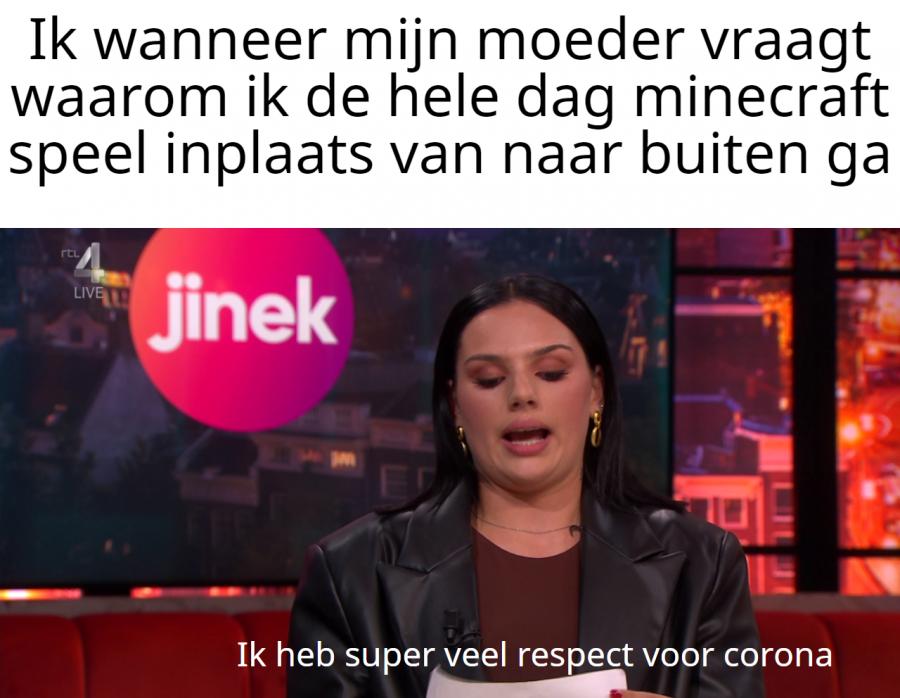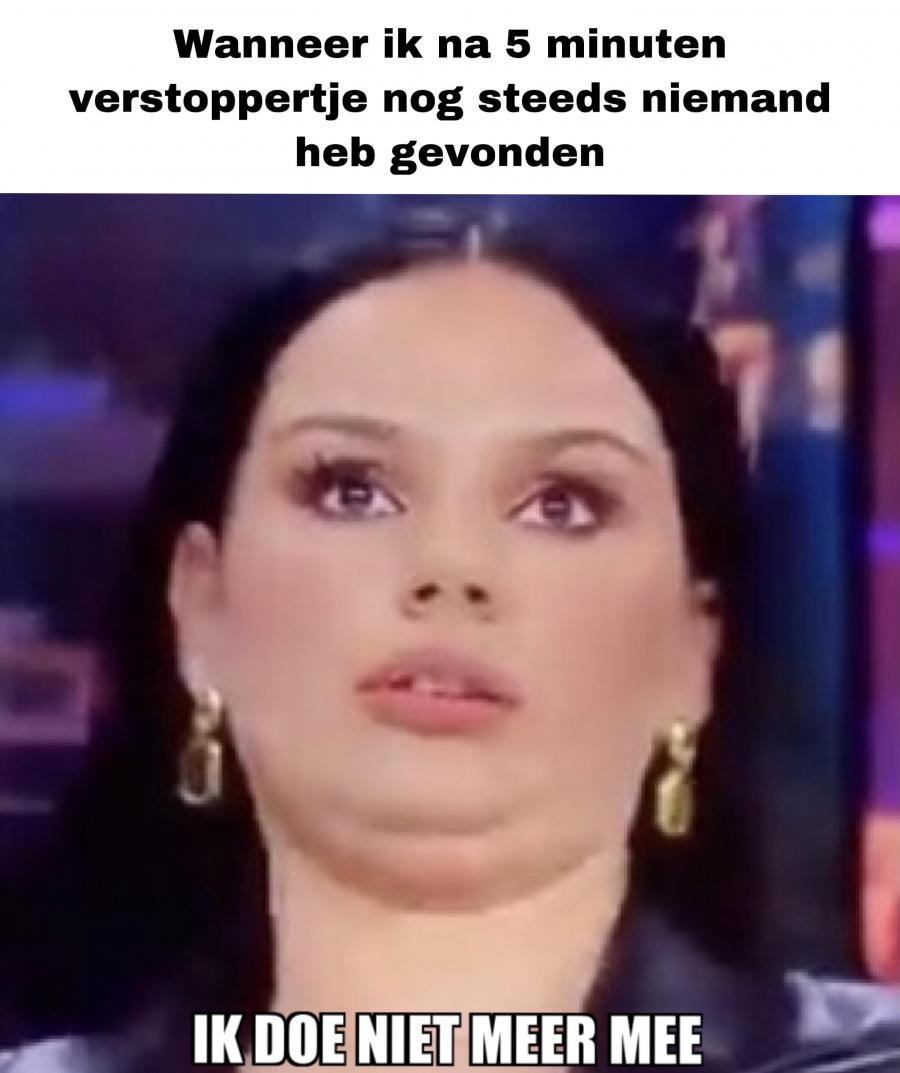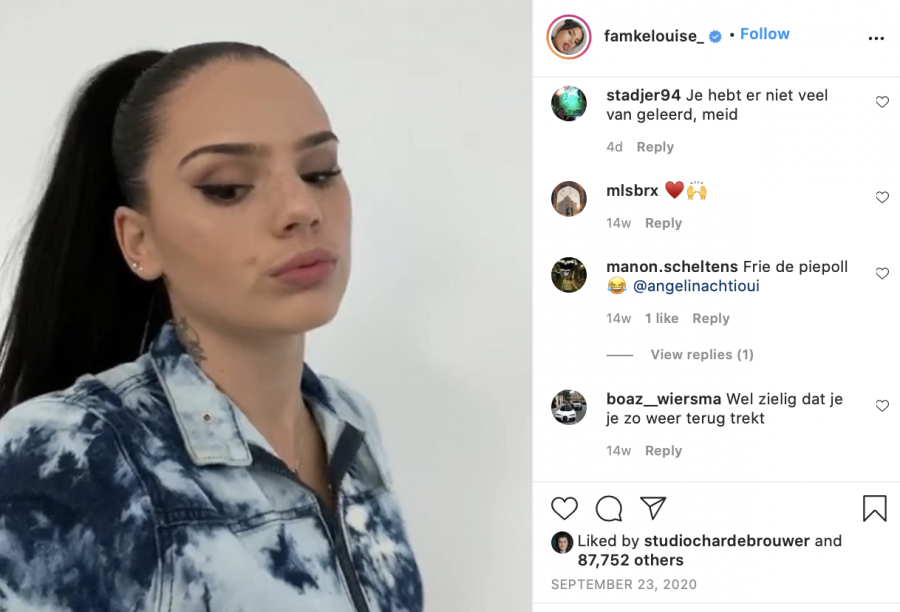
Famke Louise: The impact of social media on polarization
This article aims at analyzing the effects of social media on polarization. It focuses on influencer Famke Louise who got trapped in a filter bubble which she vocalized with other influencers in a #ikdoenietmeermee-movement. Her deviant behavior gave rise to soft-surveillance, resulting in influencer-incredibility.
In this article Femke Louise's case is used to answer questions such as: When is using an influencer a good or bad idea, and when is surveillance justifiable? How are particular contrasting opinions noticeable, and how is this polarization tangible in society?
Famke Louis and #ikdoenietmeermee
Let’s go back to the summer of 2020, right after the Covid-19 outbreak in the Netherlands. To prevent the virus from spreading and killing, the Dutch government entrusted society with rules and restrictions such as keeping distance and wearing face masks in public spaces. This also meant the cancellation of parties and large events, and the closing of bars and clubs.
These restrictions had a significant impact on artists who are, just like freelancers, depending on the number of employment opportunities. As a reaction to the measures and the lack of financial support, a handful of Dutch artists created the hashtag #ikdoenietmeermee, meaning ‘I no longer participate,’ which they communicated via their popular social media channels such as Instagram and Facebook on Monday 21st of September 2020. Their message called for a more critical look at the Corona-restrictions and to doubt the advice from the National Institute for Public Health and the Environment (RIVM).
The messages showed clearly how these influencers turned their back on all pieces of advice, rules, and Corona-restrictions imposed by the Dutch government. By going against the current, these artists distanced themselves from what was considered normal in times of a global pandemic: sticking to authorities' rules. This made others see them as “‘outsiders’…people who are judged by others to be deviant and thus to stand outside the circle of ‘normal’ members of the group” (Becker, 2008). Why is this interesting and worth researching? These influencers constructed normality among themselves: they acted as if their mission was 'a holy one’ while forcing their morals on others (Becker, 2008).
Famke Louise as target
One of the artists who threw the hashtag out in the open is Famke Louise, a 22-year-old Dutch singer, model, and YouTuber. This raised many eyebrows since several months before the #ikdoenietmeermee happening, Famke participated in a Corona campaign sponsored by the government to raise awareness for the seriousness of Covid-19 (AD, 2020).
Within minutes after her controversial Instagram post claiming the exact opposite, she received many comments from loyal followers to concerned colleagues. This resulted in two different parties who not only commented on Famke Louise but also started to comment on each other (Louise, 2020).
Jinek, a daily talk show broadcasted live on TV presented by Eva Jinek, picked up the commotion of the #ikdoenietmeermee-movement and invited Famke to join the show. That same evening, Famke sat next to Jinek and, among others, across from Diederik Gommers. Gommers is a well-known intensive care doctor and joined the show a couple of times before communicating the seriousness of the Covid-19 situation. Needless to say, Gommers and Famke did not share the same vision about living up to the Corona restrictions.

Image 1, Famke Louise at Jinek 21/09/2020
Clearly, Famke finds herself in an environment with like-minded people who share her opinion and work in the same atmosphere. This gave her a one-sided view and perspective on the Corona case in general (Pariser, 2011). After some critical questions from Gommers, Famke got tangled up in her own words, did not know what to answer, and said some doubtful phrases. To get herself together, she reached for help and took out a paper that looked a lot like a cheat sheet.
The first thing she said after looking at the paper was “well, you know, first of all, I have so much respect for Corona”. This specific phrase became noticeable and popular and quickly turned into a meme (image 1). The image shows a combination of text and image. “When my mom asks me why I play video games all day instead of playing outside”, is the sentence on top of the meme. The image itself is a screenshot of the moment Famke grabbed her cheat sheet and said the famous words. The image and corresponding line of text is is taken out of context and meta-discursively recontextualized to create a new discourse within a new context with the goal to emphasize the stupidity of her words (Blommaert, 2005). In different words: they used it to make fun of her.
“The previous video will be deleted as I no longer support my own words" (Louise, 2020)
After a day of radio silence, Famke posted a picture with an explanatory caption on the 23rd of September as a response to her moment at Jinek. The post included a screenshot of the now-deleted #ikdoenietmeermee video on the 21st of September (image 2). In the caption of the post, Famke explains the what’s, why’s, and how’s of her previous post, and apologizes for any inconvenience her words had caused. She writes about her feelings as the mainstream media chose her as a target while she, unprepared and nervous, took a spot at the table of Jinek. Also, the lack of support and comfort from her environment hurt her, yet she does not want to be seen as a victim in the situation. “The previous video will be deleted as I no longer support my own words" (Louise, 2020). Again, Famke changed her mind.
Image 2, Famke's Instagram post on 23/09/2020
The comments on the posts in Image 2 are, just like the original one on the 21st of September, very much divided into two opposing parties: the people who respect her apology and leave a comment to support her, and the people who detest her statement and leave a comment in which they make that pretty clear. The way the latter is vocalized is quite interesting since the discourse which is used in the comments are twisted and highlighted phrases of Famke Louise herself. For example, many comments mention "Free de piepol", in which they intend to make fun of her pronunciation of the word ‘people’. This directly appeals to her credibility since correctness is a discourse feature we associate with the ‘truth’ (Blommaert, 2005).

Image 3, Famke meme #ikdoenietmeermee
Another sentence strongly linked to Famke’s performance, as it is the hashtag that connects all the anti-corona-measures influencers-posts, is the popular phrase "ik doe niet meer mee", which became visible in the several memes following up the event at Jinek (image 3). The text on the top of the image mentions "after five minutes of playing hide and seek, and I still haven’t found anyone". The image is a screenshot from Famke’s performance at Jinek, with a not-so-cleaver expression on her face. Every single argument (facial expression, word pronunciation, statement, etc.) is taken out of context and individually underlined to emphasize the incredibility of Famke Louise. She also writes in the caption (to save her last piece of dignity) a promise to educate herself, learn more about the killing Covid-19, and be more subtle regarding her discourse in the future.
The incredibility of a doubting influencer
In an interview a week later, Famke tells the RTL reporter the situation took its toll on her. Nevertheless, she was happy to uncap a collaboration between her and Diederik Gommers, which should have resulted in an awareness campaign to educate the Dutch youth about Covid-19 (RTL, 2020). However, a month later, Gommers tells the media it was solely an idea, and no action was taken whatsoever (Mediacourant, 2020). In fact, in mid-January 2020, right before another lockdown, including curfew in the Netherlands, Famke decided to record her new video clip in a warehouse with almost seventy people. Her Instagram account tipped off the police, who came storming in a few hours later to hand out fines (NOS, 2021).
To conclude the analysis of the images above, it is safe to say that the credibility of Famke took a setback. This happened only due to the surveillance from her followers and colleagues, calling her out on her dangerous act. Since Famke and some of her like-minded colleagues called for the Corona rules to be disobeyed, they literally put lives on the line as they have an influential position. With them being deviant from the mainstream, this dangerous act legitimated online citizen-surveillance.
Surveillance means “the prolonged observation of person(s) who are considered to be at risk of causing potential harm or threat” (Patel, 2012). Which is, in this case, performed by critical followers and people who commented on Famke’s behavior. As a result, she has been under the public's enhanced gaze in everyday interactions as an act of soft surveillance (Patel, 2012). This is noticeable when looking at her recent posts, roughly posted four months after the #ikdoenietmeermee-situation. People, followers, haters, and random outsiders are still commenting with typical phrases such as #ikdoenietmeermee or "Free the people!" (Louise, 2021).
Reasons for the escalation
During the Corona pandemic, people have increased social media use in general by 8% (eMarketeer, 2020). This rise in usage, in combination with the fact that during a pandemic, people are afraid, isolated, and powerless, makes it easier for misinformation to spread. Especially when it is (mis)information about the pandemic itself. Insecurity makes people long for explanations, which results in Googling for a quick answer.
Google, or other search engines, collects user statistics, search histories, and click-bait, to keep providing similar information. At this moment, the user is shown no contrasting viewpoints on political or moral issues. As a result, the user gets trapped in a filter bubble. This resulted in several conspiracy theories linked to Covid-19: hence, the influencers who got influenced by their algorithm, discussed it with each other, created their own reality, and believed it (Pariser, 2011).
Social media has been the perfect tool for people who go against the mainstream or distrust mainstream media as it provides an alternative platform to share and spread their distrust and suspicion towards authorities. Moreover, individuals tend to consume media aligning with their vision and at the same time avoid media that differ in perspective, which influences polarization and group homogeneity (Mitchell, 2014; Spohr, 2017). Polarization is, therefore, a result of human interaction, which makes it a social construct.
During the Corona pandemic, people have increased social media use in general with 8% (eMarketeer, 2020).
With the use of social media, these ‘others’ are able to easily find other people with the same line of thought, resulting in particular groups of partisans who disseminate their ‘different’ opinions via, for example, Instagram, Facebook, or Twitter (Pariser, 2011). These social media platforms give, or rather emphasize, the opportunity to provide comments on a placed post: often resulting in two opposing parties who go after each other (the well-known Twitter threads filled with broil). On the one side, the ones who agree. On the opposite side, are the ones who disagree with the opinion in the post. The particular discourse used in these comments and posts defines the 'us' and 'them' in a particular digital situation, which results in a discourse that emphasizes separation. This division is not only tangible in the online world; it also has its effects in the offline world and in the online-offline nexus.
The socio-cultural and socio-political consequence of the division in opinions causes polarization in society due to divergent disagreements (Sphor, 2017). Numerous online environments like Facebook groups, YouTube channels, and WhatsApp chats promote offline protests, leading to actual demonstrations. This makes polarization even more tangible in society (Heck, 2019). In trying to maintain the truth, most social media platforms have taken responsibility and do their best to dismiss fake news or dangerous profiles (Wardle, 2020). “Facebook, Twitter, and YouTube have taken steps to tackle misinformation during the pandemic, such as partnering with more fact-checkers and pledging to remove certain content. Researchers said they welcomed these moves, but the crackdowns just pushed these groups to use alternative video platforms that have little to no moderation.” (Sanz, C. 2020).
References
Becker, H. S., & Becker, H. S. (2008). Outsiders (New ed). Amsterdam University Press.
Blommaert, J. (2005). Discourse (Discourse ed). Cambridge University Press.
Famke Louise reageert op kritieke over #ikdoenietmeermee. (2020, 23 september). Eva Jinek.
Heck, W. (2019, 17 augustus). Terreur op basis van een complottheorie. NRC.
Mediacourant. (2020, 27 oktober). Diederik Gommers en Famke Louise uit elkaar. Mediacourant.nl.
NOS. (2021, 15 januari). 66 coronaboetes uitgedeeld bij opnames videoclip Famke Louise.
Patel, T. G. (2012). Surveillance, Suspicion and Stigma: Brown Bodies in a Terror-Panic Climate. Surveillance & Society, 10(3/4), 215–234.
RTL Boulevard. (2020, 1 oktober). Famke Louise mentaal gebroken na Jinek-optreden. YouTube.
Spohr, D. (2017). Fake news and ideological polarization. Business Information Review, 34(3), 150–160.
